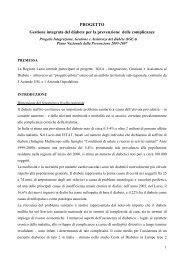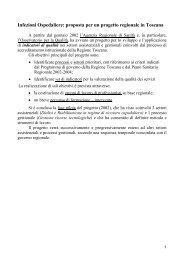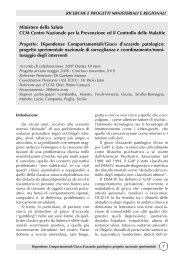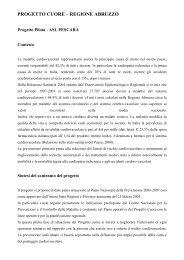Gaining health : analysis of policy development in European ...
Gaining health : analysis of policy development in European ...
Gaining health : analysis of policy development in European ...
Create successful ePaper yourself
Turn your PDF publications into a flip-book with our unique Google optimized e-Paper software.
the most appropriate prerequisites for <strong>health</strong> <strong>in</strong> given situations.<br />
Nevertheless, the persistence and scale <strong>of</strong> <strong>in</strong>equalities<br />
<strong>in</strong> <strong>health</strong> status that exist with<strong>in</strong> <strong>European</strong> societies and<br />
between the populations <strong>of</strong> high-, medium- and low-<strong>in</strong>come<br />
countries make it necessary to identify the components <strong>of</strong><br />
<strong>policy</strong> <strong>development</strong> that are critical to clos<strong>in</strong>g the <strong>health</strong><br />
gaps <strong>in</strong> Europe. There is also a need to identify standards<br />
and <strong>in</strong>dicators that can be used to improve practice.<br />
Intersectoral action and collaboration with multiple actors<br />
is the essence <strong>of</strong> NCD <strong>policy</strong>, but the <strong>in</strong>terests <strong>of</strong> potential<br />
partners do not always converge with those <strong>of</strong> NCD <strong>policy</strong><br />
implementation. The case studies presented here <strong>of</strong>fer<br />
examples <strong>of</strong> both converg<strong>in</strong>g and conflict<strong>in</strong>g <strong>in</strong>terests, but<br />
there does not appear to be any comprehensive assessment<br />
<strong>of</strong> the possible converg<strong>in</strong>g and conflict<strong>in</strong>g <strong>in</strong>terests <strong>of</strong> other<br />
sectors <strong>in</strong> relation to NCD <strong>policy</strong> <strong>development</strong>. It could<br />
be <strong>in</strong>terest<strong>in</strong>g to assess this, not only from the perspective<br />
<strong>of</strong> the <strong>health</strong> sector but from the perspective <strong>of</strong> the other<br />
sectors themselves.<br />
F<strong>in</strong>ally, despite the diversity <strong>of</strong> the specific national experiences,<br />
differences <strong>in</strong> <strong>health</strong> systems and different patterns<br />
<strong>of</strong> economic and social <strong>development</strong>, the study provides<br />
examples <strong>of</strong> a range <strong>of</strong> criteria for the successful <strong>development</strong><br />
<strong>of</strong> NCD <strong>policy</strong>:<br />
• clear values, which are particularly important <strong>in</strong> the<br />
context <strong>of</strong> NCD <strong>policy</strong> <strong>development</strong>, namely universality,<br />
solidarity, equity and participation;<br />
• key pr<strong>in</strong>ciples <strong>of</strong> governance <strong>in</strong> public services <strong>of</strong> special<br />
relevance for an <strong>in</strong>tegrated NCD <strong>policy</strong>, namely transparency,<br />
participation, accountability, effectiveness, efficiency<br />
and quality;<br />
• a long-term, consensus-oriented and <strong>in</strong>clusive strategy,<br />
responsive to emerg<strong>in</strong>g challenges and with special<br />
regard to political legitimacy and susta<strong>in</strong>ability;<br />
• decision-mak<strong>in</strong>g processes that are participatory and<br />
transparent to all stakeholders and citizens;<br />
• <strong>development</strong> <strong>of</strong> the necessary culture and capacities<br />
for <strong>policy</strong> <strong>analysis</strong>, advocacy and <strong>in</strong>tersectoral action for<br />
<strong>health</strong> <strong>in</strong> public adm<strong>in</strong>istration and <strong>in</strong> the research arena;<br />
• NCD <strong>policy</strong>-mak<strong>in</strong>g and plann<strong>in</strong>g <strong>in</strong>formed by the best<br />
knowledge available, <strong>in</strong>clud<strong>in</strong>g contributions from all<br />
relevant discipl<strong>in</strong>es and experience, and built-<strong>in</strong> mechanisms<br />
for monitor<strong>in</strong>g and evaluation based on clear<br />
objectives;<br />
• application <strong>of</strong> the NCD <strong>policy</strong> <strong>development</strong> pr<strong>in</strong>ciples<br />
mentioned above to both the public and the private<br />
sectors <strong>of</strong> the <strong>health</strong> system and to all levels <strong>of</strong> governance<br />
(national, regional, local) follow<strong>in</strong>g the pr<strong>in</strong>ciple<br />
<strong>of</strong> subsidiarity, to ensure an optimal allocation <strong>of</strong> tasks<br />
among the relevant levels.<br />
“Bus<strong>in</strong>ess as usual” is simply not good enough <strong>in</strong> this<br />
complex <strong>policy</strong> environment, particularly <strong>in</strong> view <strong>of</strong> new<br />
responsibilities be<strong>in</strong>g decentralized to local levels. A number<br />
<strong>of</strong> countries <strong>in</strong> this sample are mak<strong>in</strong>g <strong>in</strong>tensive efforts to<br />
modernize government and prepare their civil servants for<br />
work<strong>in</strong>g <strong>in</strong> a more <strong>in</strong>novative and flexible way to cope with<br />
a rapidly chang<strong>in</strong>g world. The need for a modern plann<strong>in</strong>g<br />
system is also apparent from the <strong>in</strong>tersectoral approach<br />
essential for tackl<strong>in</strong>g NCD. To put this simply, the <strong>health</strong><br />
sector must be able to br<strong>in</strong>g about action <strong>in</strong> fields over<br />
which it has little or no control. The question is whether<br />
traditional <strong>policy</strong>-mak<strong>in</strong>g and plann<strong>in</strong>g systems <strong>in</strong> the <strong>health</strong><br />
sector are appropriate for cross-sectoral plann<strong>in</strong>g. On the<br />
other hand, a strong focus <strong>in</strong> some countries on address<strong>in</strong>g<br />
poverty and social exclusion could open new avenues for<br />
tackl<strong>in</strong>g the determ<strong>in</strong>ants <strong>of</strong> <strong>in</strong>equalities <strong>in</strong> NCD.<br />
References<br />
1. <strong>Ga<strong>in</strong><strong>in</strong>g</strong> <strong>health</strong>: the <strong>European</strong> Strategy for the Prevention and<br />
Control <strong>of</strong> Noncommunicable Diseases. Copenhagen, WHO<br />
Regional Office for Europe, 2006 (http://www.euro.who.<br />
<strong>in</strong>t/document/E89306.pdf, accessed 11 June 2009).<br />
Chapter 5<br />
249<br />
Reflections on experiences

















